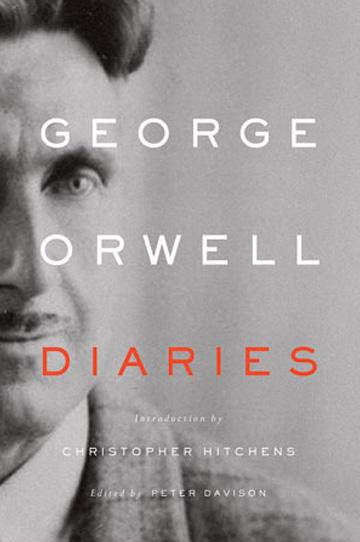
Record of Achievement
July 1, 2012 | Wilson Quarterly
George Orwell (1903–50), the moral compass of the 20th century, had his own true north: farming and fishing in peace. He spent the last years of his life on the rural island of Jura, off Scotland, fighting tuberculosis and writing his sixth and final novel, Nineteen Eighty-Four (1949)—one of the great books of our time. In his diaries, Orwell does not discuss his novels directly, but the terse, factual entries recording weather and the number of eggs given by the hens each day do offer a sense of his ideal working conditions. It is hard to say whether he craved distraction or merely kept his priorities straight when one reads entries like this: “Diary not kept up for several days owing to pen being mislaid.”
Orwell’s diaries were first published in 1998 as part of the 20-volume The Complete Works of George Orwell. The diaries are now available in a single volume for the first time in the United States. Written from 1931 to 1949, they remind us that most of Orwell’s life was not so pastoral. Instead, it was filled with dramatic adventures that fueled his writing and shaped his politics. The journalist George Packer has called Orwell an “empirical absolutist,” meaning that he hated to write about a thing he had not personally experienced.
The early entries cover Orwell’s days as a tramp, a period that provided material for Down and Out in Paris and London (1933), and his subsequent investigation of poverty in the industrial north of England, from which he drew for The Road to Wigan Pier (1937). This volume’s lacuna is Orwell’s experience fighting the fascists during the Spanish Civil War. Plainclothes policemen in Barcelona seized the one or two diaries that recorded those events, and delivered the work to the Soviets. Though the writings likely remain in the archives of the former KGB, Orwell transformed them into literature as well, with the extraordinary memoir Homage to Catalonia (1938).
Of greatest interest are entries from the periods of Orwell’s life that he did not turn directly into books. His World War II diaries are the highlight. Although all of the entries feature Orwell’s direct prose style, there are occasional hints of the novelist at work: “Characteristic war-time sound, in winter: the musical tinkle of raindrops on your tin hat.” And there are ominous passages that reveal his unusually clear view of the awful century unfolding, such as this one from June 1940 that prefigured his 1945 novel Animal Farm:
Where I feel that people like us understand the situation better than so-called experts is not in any power to foretell specific events, but in the power to grasp what kind of world we are living in. At any rate I have known since about 1931 . . . that the future must be catastrophic. I could not say exactly what wars and revolutions would happen, but they never surprised me when they came. Since 1934 I have known war between England and Germany was coming, and since 1936 I have known it with complete certainty. . . . Similarly such horrors as the Russian purges never surprised me, because I had always felt that—not exactly that, but something like that—was implicit in Bolshevik rule. I could feel it in their literature.
Orwell volunteered for military service days after Germany invaded Poland, but was turned away because of poor health. His frustration comes through in entries despairing of the uselessness of writing at such a time. Determined to contribute somehow, he eventually became a sergeant in the Home Guard and produced war propaganda for the BBC. This was a sharp irony, for he had lashed out in the past against propagandists who worked safely away from the frontlines. Recalling just such a passage from Homage to Catalonia, Orwell spotted the hypocrisy and ruefully chastised himself: “I suppose sooner or later we all write our own epitaphs.” As the late Christopher Hitchens nicely puts it in this volume’s introduction, when Orwell discovers one of his own contradictions, “he tries his best to be aware of the fact and to profit from it.”
Yet self-awareness could not overcome an admirable, scrapping pluck: an unsuppressed, hackles-up reaction to events of the 1930s and ’40s that cast right and wrong into sharp relief. It was a time for standing up and taking sides. Thus, if Germany invaded England, Orwell vowed privately to himself, “there is nothing for it but to die fighting, but one must above all die fighting and have the satisfaction of killing somebody else first.”